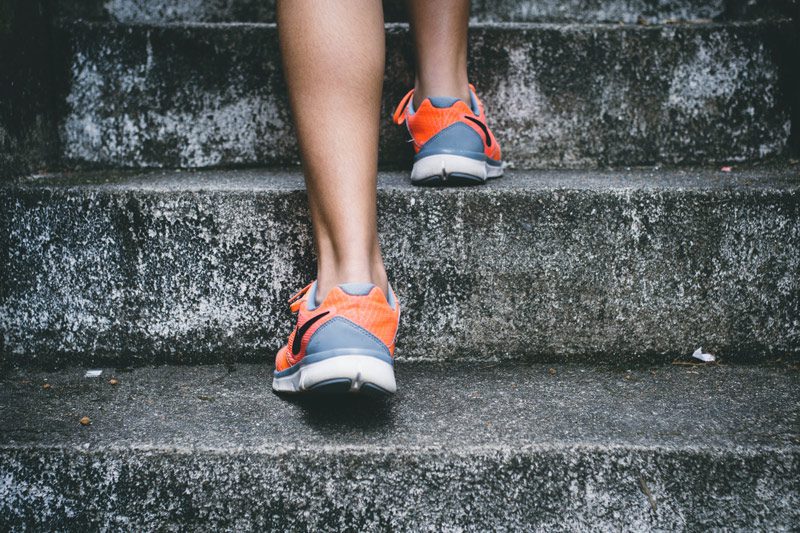When coping with anxiety and depression, many options exist to help you deal with your daily struggle. Exercise has been proven to positively impact mental health, easing symptoms of anxiety, depression, and many other cognitive problems. There are also the obvious physical benefits of exercise, such as better heart health and improved quality of life.
How can exercising reduce anxiety?
Anxiety may be the bane of your life, or it may have a minor impact on your daily activities. No matter how it affects you, regular exercise can help. This is not to say it will completely rid you of all symptoms, but by blending exercise with some of the other techniques you may already be using, you should see improvements in your life.
Exercise helps relieve anxiety by releasing feel-good endorphins associated with pleasurable activities such as eating and sex. It also activates the frontal region of the brain linked to our reactions to real or imagined threats. Exercise can help you hone your decision-making skills and improve your ability to deal with negative or intrusive thoughts. It can take your mind off worries and allow you to exit the cycle of constant negative thinking that feeds anxiety and depression. Additionally, moving your body releases muscle tension that contributes to depressive states. Muscle tension can be like paralyzing negative thoughts that overpower and immobilize you. Start exercising and feel the freedom to move and think positively.
Social benefits of exercise
Feeling healthy and in shape can significantly boost your confidence and improve your self-image. This doesn’t mean you need to lose thirty pounds to feel beautiful. When you are in a state of anxiety, setting unrealistic expectations can dig you into an even deeper hole. You may look down on yourself for not achieving your goal and continue with self-deprecating thoughts. If you can look at yourself and feel proud of the short workout you just completed, your self-confidence will improve, and those around you will notice. Exercising can increase your social interaction through group workouts or just going for an evening stroll with a friend or neighbor. It’s an excellent way to be more consistent and interactive with your workouts because you have someone else joining you on the journey.
When starting to exercise, it can be daunting to feel like an inexperienced beginner surrounded by exercising pros. Start simple. An evening stroll with a friend is a comfortable way to get started. You can take it one step further by getting out in nature for your daily exercise. Studies have shown that a 60-minute walk in nature can reduce activities in stress-processing regions in the brain. Coping with anxiety in an unhealthy way is where many people go wrong. Drug and alcohol use or unhealthy eating patterns can significantly worsen your symptoms, impeding your recovery. If you don’t deal with the problem now, you can get stuck in a cycle of avoiding the issues and feeling most immobilized when least wanted.
How much exercise is enough?
Getting into a new routine can be challenging, especially if you’re anxious. Incorporating exercise into an already packed schedule is easiest if you keep it light at first. You may already have a job that requires physical activity, such as being a laborer. Being a full-time mom can also be physically demanding. Give yourself a 30-minute-a-day challenge for your first week to get started. Whether you go for a walk outside or even brave the gym, the important thing is to just show up. You may not even make it to the 30-minute mark, but as long as you create the habit of showing up every day, ideally at the same time, you will see gradual improvement.
Consider how much time you spend on social media each day. If it’s more than 30 minutes, why not replace 30 minutes of phone time with 30 minutes of exercise? The idea isn’t to become an Olympic athlete but to show yourself you’re capable of doing more than sitting in a state of anxiety, allowing it to hold you back from reaching your potential. Eventually, you may find yourself stepping outside your comfort zone, joining group workout classes, and participating in different activities such as dancing or rock climbing. The possibilities are endless. Not only will you be contributing to your positive mental health, but you could be gaining a new skill you have always dreamed of learning. Look at those first 30 minutes as a gateway to the new, anxiety-free version of yourself.
How to stay motivated
Staying consistent with a routine will likely be your biggest challenge. Life constantly seems to get in the way of our ambitions, but don’t let self-deprecating thoughts be what holds you back. Set a consistent time slot for you to exercise. If you waver from your schedule, ask a friend to hold you accountable and check if you’re sticking to your plan or to join you in your workouts.
Tracking your workouts is also beneficial. There are many workout tracking apps for you to note your progress. Or you can keep things simple by recording your workouts in a notebook. The sense of achievement you will feel looking back on your efforts and how much you have improved will give you a tremendous boost of self-esteem and help you beat anxiety.
About the Author: Daisy Moss is a freelance writer specializing in healthy living, with a love for self-improvement books and exercise. In her spare time, she loves to put on a pair of gym leggings, listen to an interesting podcast and unwind in nature.
Photo by Bruno Nascimento on Unsplash
The opinions and views expressed in any guest blog post do not necessarily reflect those of www.rtor.org or its sponsor, Laurel House, Inc. The author and www.rtor.org have no affiliations with any products or services mentioned in the article or linked to therein. Guest Authors may have affiliations to products mentioned or linked to in their author bios.





